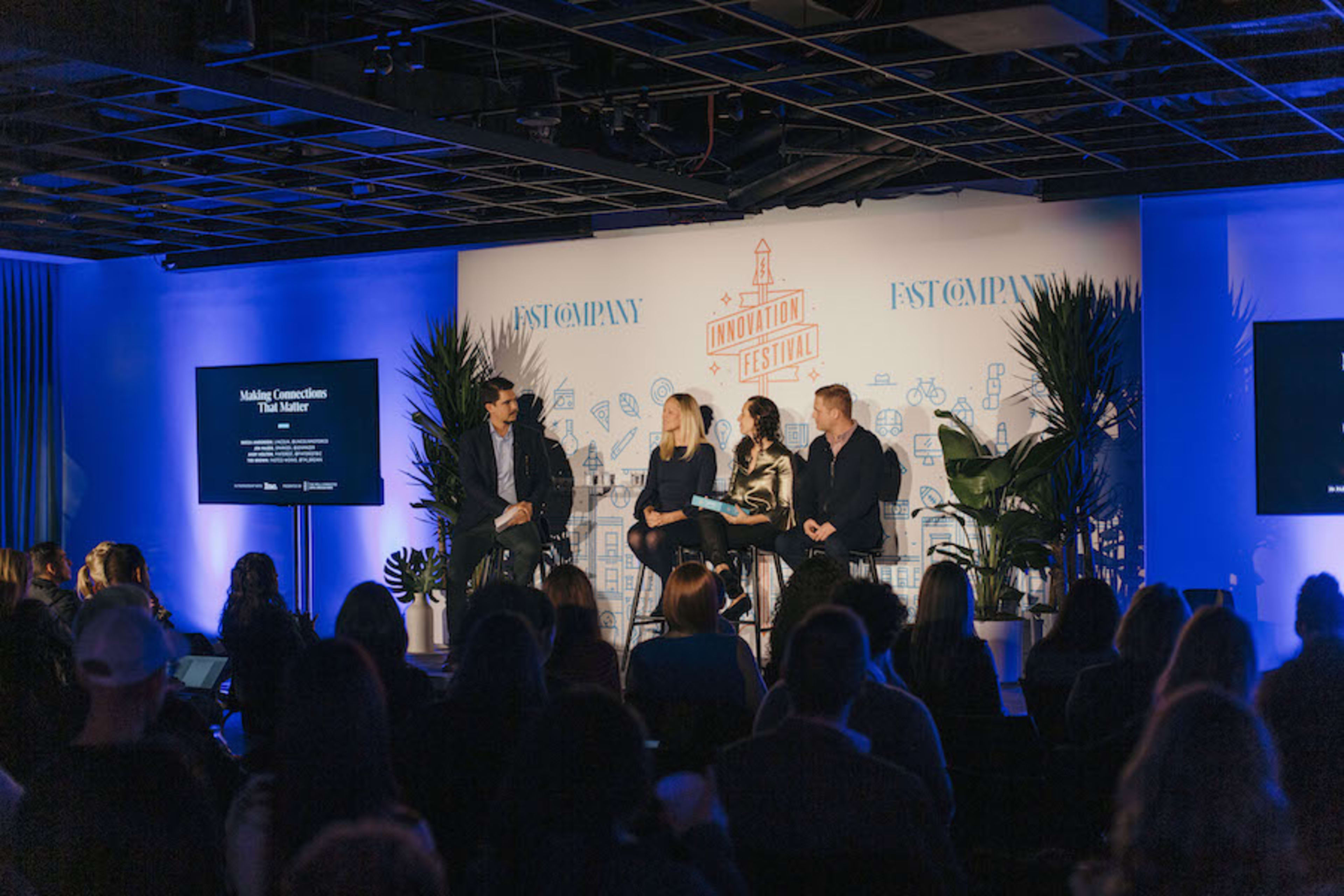Time was on everyone’s minds at this year’s Fast Company Innovation Festival, including carmaker Lincoln. During a panel entitled “Making Connections That Matter,” the luxury automaker discussed how it’s trying to give its clients the gift of more time through innovative technology and personalized service. “When we think about our clients, we’re thinking about this time compression that they feel in their lives,” Becca Anderson, client experience manager at Lincoln, told the panel audience. “I think about what that means to me in the morning. That 10 or 15 minutes off of my commute can be the difference between seeing my girls before they go into their school day, versus being out the door before they wake up.”
It’s a topic that anyone who has dealt with a deluge of errands or a grueling commute can easily identify with, and Lincoln is leveraging technology, such as in-car integration with Waze, along with personal touches, including complimentary pickup and delivery for Lincoln clients. “We think a lot about how we can create warm, human, and personally crafted experiences for our clients,” Anderson said. “And that can be enabled by really smart and effective technology.”
Johnson was joined on the panel by Andy Horton, head of creative strategy at Pinterest, and Jen Mazer, co-creator of the board game Sparked. Both professed to be acutely aware of how time itself is becoming an increasingly precious resource—that as we’re asked to do more and more with our day, those moments where we can reclaim the clock are more important than ever.
GAMING THE SYSTEM
The deluge of social media, video, TV, movies, and more has led to a near infinite amount of entertainment at our fingertips. But, according to Mazer, that’s only made the desire to slow things down and get together in person that much more pronounced. “People are on their phones and [using] social media so much, they’re craving personal connections,” she told the panel audience. “Sparked provides a way for us to get together and actually see each other, and experience things together outside of those virtual communities.”
That might explain why board games are experiencing a resurgence. Sales rose 28% between 2016 and 2017, spurred by the success of games like Settlers of Catan and Ticket to Ride, both of which, unlike your average mobile game, take at least a couple of hours to play. (Even Dungeons and Dragons, the godfather of tabletop games for which adventures are measured in days rather than hours, has gone through a renaissance, marking its biggest sales year in 2017.) The deliberate pace of board games was something that resonated with Mazer. In Sparked, a group of players spin a wheel and draw themed cards grouped into categories such as happiness and adventure. The group members then share their answers with each other, which Mazer says strengthens bonds and lets people talk about “real things” with each other. “It’s about building authentic connections between people,” she said. “You hear stories about people’s lives and it brings you closer to one another.” Since such moments are increasingly fleeting and precious, Mazer has made it her mission to ensure people are still making time for those priceless moments.
JUST DO IT
For Andy Holton at Pinterest, the rise of collaborative software marked the beginning of a whole new way of working—one that saved loads of time. Holton was a veteran of some of Chicago’s top ad firms before joining the San Francisco-based discovery platform, and he recalled long nights spent waiting for edits to bounce back and forth between different copywriters and creative directors before he could move forward on an idea. “We wrote a lot of scripts, and we’d get a brief at night and come back in the morning and share our scripts and you’d sit there and you’d wait,” Holton told the panel audience, whose reaction indicated they shared his pain. “Now, you can collaborate on a Pinterest board through visuals or, if you’re writing scripts, you can actually collaborate in real-time with Google Docs.”
Holton sees the ability of tech to eliminate those hours of idling as a way to let people do more of the things they enjoy—and to get to them sooner. It’s one reason why Pinterest opened up its platform to attributes more commonly found on social networks, including the ability to comment on pins. “Even though the ideas are curated by other like-minded people, Pinterest is about you, so we were a little nervous about enabling some of these social features,” Holton said. “But what it allows is [the ability to] creates communities online, and [to] connect with people in the comment sections. It’s actually making you more productive by getting you to that idea faster, and then you can take action on it faster.”
Closing the gap between interest and action is at the heart of Pinterest’s mission, and the company is committed to inspiring its users to set aside their screens and embracing their passions in the real world. As Holton told the audience, if someone finds something they’re interested in on Pinterest, they want to make it “easy for them to go out and do it.”
This article was created for and commissioned by Lincoln.
Recognize your brand’s excellence by applying to this year’s Brands That Matter Awards before the early-rate deadline, May 3.
